Creating the future of Quantum Computing
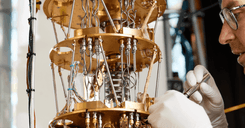 Solving major future tasks through quantum computer technology.
Solving major future tasks through quantum computer technology.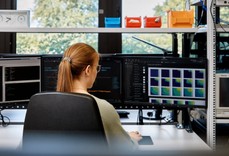 You take us further, we take you further.
You take us further, we take you further.
further,
we take you
further.

- QSOLID
Twenty-five German research institutions and companies are working on a quantum computer with improved error rates in the collaborative project QSolid. The project aims to develop a comprehensive ecosystem that will be integrated into Forschungszentrum Jülich’s supercomputing environment and made accessible to external users. The goal is to make Germany a global leader in the field of quantum technology and thus to maintain independence and open up numerous new applications in science and industry.
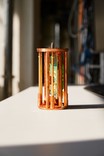
- ML4Q Cluster of Excellence

To realize topological error correction, one needs reliable building blocks connected by quantum links. We develop a quantum bus to shuttle spin qubits over micron-scale distances. This will be used to make, and test connected arrays of spin qubits for error-correcting surface codes. We expect that future quantum technologies will build on networks linking solid-state qubits to flying qubits made from light. We will coherently couple a spin qubit to light, use this to build a heterogeneous network involving spin qubits and trapped ions, and couple Majorana states to microwave photons.
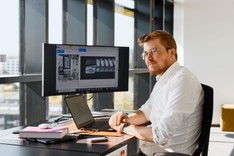
- QLSI
The EU-funded QLSI project aims to demonstrate that silicon spin qubits are a compelling platform for scaling to very large numbers of qubits. Demonstration activities will focus on the following: 16-qubit quantum processors based on modern semiconductor manufacturing techniques; high-fidelity single- and two-qubit gates; quantum computer prototypes with online open-access for the community (up to 8 qubits available online); documentation of the detailed requirements to address scalability towards large systems > 1 000 qubits.
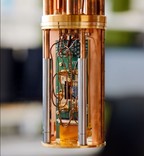
- QUASAR
The goal of this project is the implementation and demonstration of a microarchitecture overcoming previous geometric scaling limits on the quantum level with semiconductor technology available in Germany. The technological basis for this is Si/SiGe quantum wells, for which the reproducibility of qubits has already been demonstrated. A central element is the shuttling of electrons on the chip to couple qubits to each other in a scalable way. In the project, all essential architectural elements and their functions are to be demonstrated with competitive quality.
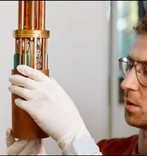
- QUANTERA SiQubus
JARA IQI participates to the QuantERA network with the project "Long-range quantum bus for electron spin qubits in silicon" (Si QuBus). QuantERA is a network of 31 organisations from 26 countries that supports international research projects in the field of Quantum Technologies (QT). QuantERA answers the growing need for collaborative endeavours and common funding schemes within QT research, which due to its highly interdisciplinary nature cannot be confined to an individual institution or state.
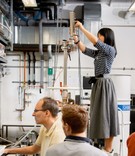
- OpenSuperQ
Prof. DiVincenzo is member of the European FET Flagship project OpenSuperQ, which aims at designing, building and operating a quantum information processing system of up to 100 qubits and at sustainably making it available at a central site for external users. For more information about the OpenSuperQ project, please visit opensuperq.eu. More information about the European Quantum Flagship, one of the largest and most ambitious research initiatives of the European Union, can be found here: qt.eu.
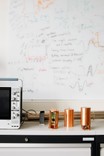
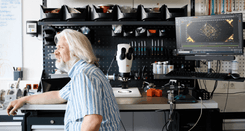 Develop your talent without pressure.
Develop your talent without pressure.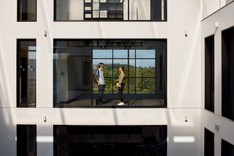 Welcome to a team of like-minded people.
Welcome to a team of like-minded people.
My research focuses on the development of a scalable architecture for semiconductor spin qubits, with the goal of transferring the recently achieved high fidelities to a fully functional quantum computer chip. Through my work at IQI, I have not only learned a lot about physics and electronic topics that are not in the physics curriculum, but I have also been able to develop as a person in how to communicate and present research.
Alex, Ph.D. Student

The specific project I am working on is measuring the valley splitting and mapping the valley splitting in the Qbus sample. The purpose is to characterise the Qbus sample - to know exactly how the valley splitting is distributed in the sample, which will later give an indication of the coherent shuttling. The IQI offers me a good opportunity to do systematic scientific research in methodological terms and also helps me to improve my patience because you have to wait often and for a long time because of the measurement time or because of the production.
Bingjie, Ph.D. Student
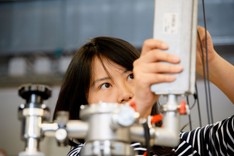
During my time here at the Institute under the guidance of Prof. Bluhm, I have learned to structure, conduct and communicate my research with a high degree of autonomy and personal responsibility. A craft that has demonstrably increased the quality of my analytical and critical thinking and makes my research more purposeful. As for the social side of things: I met great people with whom I had the honour/opportunity to attend the annual institute conference in the Alps and spend several dinners holding in-depth discussions about technology, politics and our individual hobbies.
Paul, Ph.D. Student
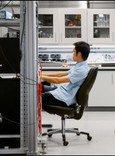
I am currently working on laser annealing for ohmic contacts in Si/SiGe heterostructures with the aim to improve the device performance deterministically by a non-invasive fabrication technique. During my Master thesis, I learned a lot in terms of fabricating and measuring samples. In our group's weekly journal club, we discuss and review recent developments in our field. I appreciate working at our institute as our group is really nice and provides a pleasant working atmosphere. I felt welcome right from the start and relish meeting the team for a drink! I also really enjoyed our institute outing to Söllerhaus in Austria as it was a great opportunity to get to know my colleagues better.
Isabelle, Ph.D. Student
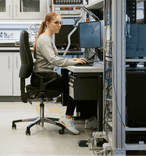

PGI-11
Forschungszentrum Jülich GmbH
Wilhelm-Johnen-Straße
52428 Jülich
+49 241 80 27075
Offices at:
PGI-11
Forschungszentrum Jülich GmbH
Campus Boulevard 79
52074 Aachen
Quantum Technology Group
RWTH Aachen University, Physikzentrum
Otto Blumenthal Straße
52074 Aachen